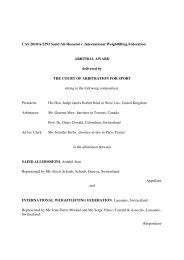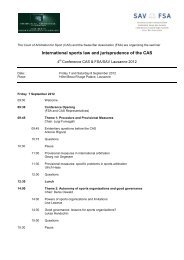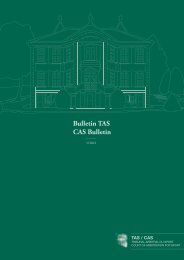CAS 2010/A/2071 - Tribunal Arbitral du Sport / TAS
CAS 2010/A/2071 - Tribunal Arbitral du Sport / TAS
CAS 2010/A/2071 - Tribunal Arbitral du Sport / TAS
You also want an ePaper? Increase the reach of your titles
YUMPU automatically turns print PDFs into web optimized ePapers that Google loves.
<strong>CAS</strong> <strong>2010</strong>/A/<strong>2071</strong> IFA v/ FAI, Kearns & FIFA - Page 14<br />
52. The IFA did not accept that Mr Shricker’s approach applied to matches against the<br />
other British associations, which, at the time, were not governed by the FIFA<br />
regulations. The issue was raised on several occasions before FIFA, which<br />
initially deemed that it was not in a position to interfere in the matter, but later<br />
accepted to intercede when the IFA brought to its attention the fact that the FAI<br />
was putting pressure on players from within its jurisdiction to sign an undertaking<br />
not to play for the IFA.<br />
53. On 17 April 1951, the General Secretary of the FIFA wrote the following letter to<br />
the IFA:<br />
“The Executive Committee of the F.I.F.A. considered the complaint made by your<br />
Association against the F.A. of Ireland at its meeting in Madrid, and have<br />
directed us to confirm that the Football Association of Ireland would act contrary<br />
to the F.I.F.A. regulations if they imposed conditions or restrictions before a<br />
player was transferred to another association in membership with the F.I.F.A., if<br />
his transfer documents were otherwise completely in order.<br />
On the other hand, the Executive Committee consider it inadmissible to select<br />
players, being citizens of Eire, for the representative teams of a country other<br />
than Eire. An exception from this rule is only allowable in respect of the<br />
international matches between the four British Associations if those countries<br />
agree and the F.A. of Ireland do not object, but not for matches played in Jules<br />
Rimet Cup”.<br />
54. The IFA submits that the effect of this letter was to extend the “ruling” of 18<br />
October 1946 to matches between the British associations.<br />
55. The Panel reminds itself that the purpose of historical interpretation is to consider<br />
the historical conditions in, from and because of which the current legal text<br />
originated. It requires ascertainment of not only the genesis of but also the entire<br />
development underlying the text so as to ascertain how it obtained its final<br />
linguistic expression and to enable useful comparison to be made of the present<br />
with any previous rules regulating the same legal matter. It is as a result of such a<br />
comprehensive exercise that the historical interpretation can assist in establishing<br />
the meaning of a legal text (ATF 133 III 257, consid. 2.4 and 2.5.2). In the<br />
present appeal, however, the IFA limited its presentation of the historical facts to<br />
the events surrounding the FIFA letter dated 17 April 1951. It gave no<br />
consideration, and provided no exposition to the Panel, of how the situation has<br />
evolved since the 1950’s and, in particular, how the FIFA regulations have<br />
developed between the 1950 and the <strong>2010</strong>. This is particularly important as this<br />
period of time was marked by significant political changes in Ireland and<br />
elsewhere.<br />
56. What the IFA calls the “1950 FIFA ruling” is no more than an exchange of letters<br />
between the FAI, the IFA and/or then the General Secretary of the FIFA. The<br />
FAI has not been able to demonstrate that (or how) such letters have the force of<br />
law or that (or how) they have a binding effect on the rights and <strong>du</strong>ties of the





